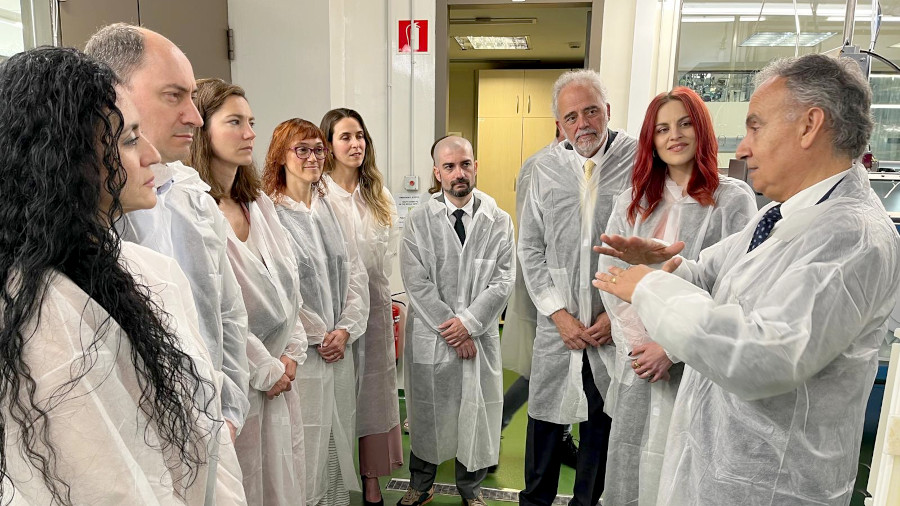30th anniversary of the UAB's MELiSSA laboratory
In 1995 the MELiSSA laboratory was opened at the UAB Faculty of Science, a unique initiative in all of Europe to demonstration and integrate life support technologies in space. In celebration of its 30th anniversary, on 6 June the MELiSSA Pilot Plant, located since 2009 at the School of Engineering, held an event that included the participation of over 100 attendants.

The celebration of the 30th anniversary of the MELiSSA laboratory was held at the UAB on Friday 6 June, at the MELiSSA Pilot Plant facilities and in the Sala de graus of the School of Engineering. The event brought together more than a hundred attendees linked to the project and was attended by prominent personalities, such as Minister for Research and Universities Núria Montserrat of the Government of Catalonia. Minister Montserrat expressed the support of the government to a project of these characteristics “collaborative, international and aimed at solving major challenges of energy transition, sustainability, food and space exploration”, as well as “the pride and gratitude of having in Catalonia this ecosystem in space research”. “Catalonia wants to become one of the 50 most innovative regions in Europe, and that implies the creation of new programmes in the area of space,” he announced.
Chloé Audas, MELiSSA project manager at the European Space Agency (ESA), also participated and presented the initiative from the agency's global vision. The project includes 16 partners from six countries, from universities, research, industry and other organisations, with more than 1,500 scientists and engineers involved. It is a project “to respond to the need to have a closed life support system for space missions,” she said, and now the necessary step will be “to include humans in this cycle, a fundamental step to test the operability, the maintenance of the cycle and the redundancy” of the processes.
Francesc Gòdia, lecturer at the UAB Department of Chemical, Biological and Environmental Engineering and director of the MELiSSA Pilot Plant, explained the trajectory of the project over these 30 years and showed his appreciation for the continuous support of the UAB, ESA, the Government of Catalonia and the Spanish government, which have been “in fine tune” since its inception. “We have the vision of maintaining an isolated human to demonstrate that this technology can support the life of a person in space”, reaffirmed lecturer Gòdia as a milestone to be reached in the next ten years.
Kyriaki Minoglou, director of the Optics, Robotics and Life Sciences Division at ESA, highlighted the MELiSSA laboratory as an “excellent tool for pushing the boundaries of science and its applications” and recalled that it is one of ESA's two external laboratories in Spain, together with the OGS telescope in the Canary Islands.
The event also featured the participation of Spanish astronaut Sara García Alonso, for whom “MELiSSA is more than a pilot plant; it is a test for a future where biotechnology will be a tool to sustain life”. García Alonso shared that, when asked about the importance of special research, she often gives as an example an ESA project based on MELiSSA technology. This is a project that is being implemented to help reduce malnutrition in the Congo and facilitates the cultivation of the cyanobacterium spirulina for use as a nutritional supplement. This bacterium can be grown in water tanks in order to produce a supplement that meets nutritional needs and improves the taste of food, García Alonso explained. For the ESA astronaut, this is “one of the most powerful examples of how space research can benefit humanity.”
Juan Carlos Cortés, director of the Spanish Space Agency, also spoke, stating that MELiSSA “fits perfectly into the future of the agency”, since “the key technology for space exploration is the development of life support systems”. “A paradigm shift in mission supply is needed, and the catalyst for this change is MELiSSA,” he said.
UAB Rector Javier Lafuente was in charge of the closing speech, in which he underlined “the importance of an initiative like MELiSSA, an ambitious project that connects the University with cutting-edge research”. Rector Lafuente stressed that this is the result of a “complex and long-term challenge that has created an international network of laboratories and a scientific community that promotes collaboration between institutions and the training of new researchers”. The rector highlighted the role of the UAB as “a university that is always open to alliances with other institutions to carry out ambitious projects”.
The MELiSSA project
MELiSSA is the acronym for Micro-Ecological Life Support System Alternative, an innovative project of the European Space Agency that was initiated as part of a research programme on life support technologies to enable long-duration manned missions in space. It is the only laboratory in Europe for the demonstration of closed-loop life support systems, a circular regeneration system that produces water, food and oxygen recovered from waste, carbon dioxide and minerals. The UAB MELiSSA Pilot Plant was started in 1995 at the Faculty of Science and, since 2009, it is part of the Department of Chemical, Biological and Environmental Engineering and the UAB School of Engineering.
The UAB, with Sustainable Development Goals
Partnerships for the goals
Clean water and sanitation